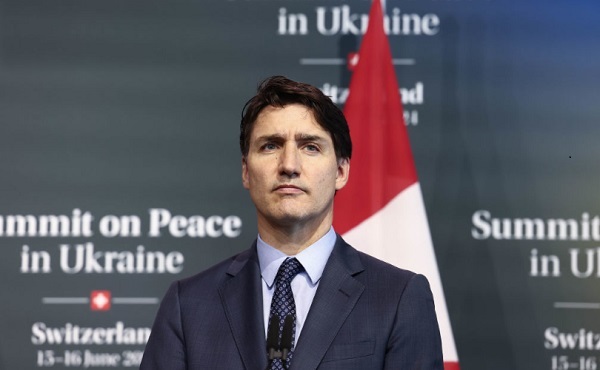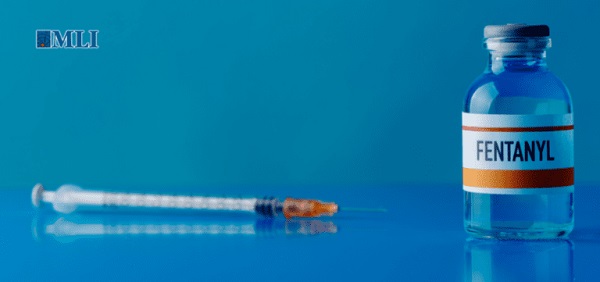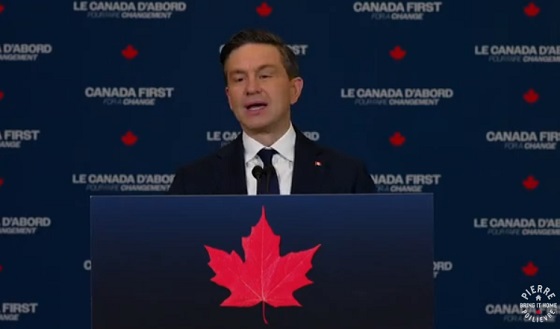National
Justin Trudeau is considering stepping down amid cabinet turmoil, reports indicate

From LifeSiteNews
According to CTV News, a source said that Trudeau is looking at his ‘options’ following the shock resignation of Deputy Prime Minister and Finance Minister Chyrstia Freeland this morning.
Reports are circulating that suggest Prime Minister Justin Trudeau is considering stepping down as leader after a disastrous day which saw his most high-profile minister resign citing him as the main reason.
According to CTV News, a source said that Trudeau is looking at his “options” following the shock resignation of Deputy Prime Minister and Finance Minister Chyrstia Freeland this morning.
Freeland today announced her resignation from the Liberal cabinet, revealing that she did so after Trudeau asked her to step down as finance minister last Friday and move into a different position.
Her public resignation letter blasted Trudeau’s economic direction and apparent lack of wanting to work as a team player with the nation’s premiers.
To make matters worse for Trudeau, just hours after Freeland’s resignation, leader of the New Democratic Party (NDP) Jagmeet Singh, whose party has been propping up the Liberal minority government, called on the prime minister to resign.
“We are calling for Justin Trudeau’s resignation,” said Singh to reporters in French and later in English.
Singh claimed that should Trudeau not step down voluntarily, he would consider voting non-confidence, saying, “all tools are on the table.”
Leader of the Conservative Party of Canada Pierre Poilievre demanded that Trudeau return to the House of Commons at once so a vote of confidence could be held “tonight.”
Trudeau has seen many ministers resign in recent months as the Liberal Party’s polling continues to trend downward. The most recent polls show a Conservative government under Poilievre would win a super majority were an election held today.
2025 Federal Election
CSIS Warned Beijing Would Brand Conservatives as Trumpian. Now Carney’s Campaign Is Doing It.

 Sam Cooper
Sam Cooper
Canadian intelligence reported in 2021 that Beijing planned to interfere in Canada’s next federal election with disinformation suggesting the Conservatives “will follow the path of … Donald Trump”—a narrative now echoed in a clandestine dirty tricks operation exposed inside Prime Minister Mark Carney’s campaign.

A 2021 CSIS intelligence bulletin marked “Secret,” warned that Chinese consular officials planned to influence future Canadian elections by portraying Conservative politicians as “Trump-like” and hostile to immigrants. The document has been redacted by The Bureau.
The warning comes from a classified CSIS bulletin dated December 20, 2021 and marked Secret, distributed to Canadian departments including Global Affairs Canada, the Privy Council Office, the Communications Security Establishment, and Five Eyes intelligence partners. The report was based on information from Chinese consular officials in Canada.
According to the CSIS assessment, a consulate official in mid-November 2021 discussed how Chinese influence in federal ridings with large Chinese-Canadian populations had proven effective, and laid out a forward-looking strategy to shape future electoral outcomes. The official reportedly stated:
“Ethnic Chinese voters should be told that if the CPC wins a federal election, the CPC will follow the path of former United States President Donald Trump and ban Chinese students from certain universities or educational programs. This will threaten the future of the voters’ children.”
The consulate official also suggested that during Canada’s next federal election, the message should be circulated that the Conservative Party of Canada “is critical of the PRC and opposed to individuals from mainland China.” The remarks were made shortly after Justin Trudeau’s Liberals won a minority government in the fall of 2021.
CSIS concluded that PRC officials believed Chinese immigrants were relatively easy to influence toward Beijing’s geopolitical goals and could be mobilized to oppose Canada’s Conservative Party. The bulletin describes a broader context in which Chinese state actors sought to paint Canadian Conservatives as hostile to immigrants, aligned with Trump-style nationalism.
The Bureau’s analysis suggests that if Chinese state-linked actors intended to repeat this narrative in the 2025 federal campaign, they would find their narrative echoed by the Liberal Party’s own war room tactics.
Prime Minister Mark Carney this morning acknowledged wrongdoing inside his campaign, following revelations that Liberal operatives had planted fake political buttons at a major Conservative conference in an effort to smear Pierre Poilievre’s campaign as a Trump-style threat to Canada.
The Liberal Party has attempted to downplay the scandal, calling it an instance of overzealous political operatives getting “carried away.” But the parallels to Beijing’s 2021 disinformation strategy—as outlined in the CSIS bulletin—raise broader concerns over domestic political campaigns echoing or amplifying hostile state narratives.
The disinformation scandal was first exposed by CBC News on Sunday, April 13. According to the report, two Liberal staffers attended the Canada Strong and Free Networking Conference last week. Observers have noted ticket prices for the event cost hundreds of dollars, suggesting the Liberal infiltration was well planned and resourced. They scattered buttons reading “Stop the Steal” along with buttons favouring Alberta secession movements and other political messages that would suggest Pierre Poilievre’s campaign is attracting MAGA-like extremists in Canada that may be open to Trump’s earlier jibes of turning Canada into a “51st State.”
The aim was to create the appearance of Trumpian division and election denialism within Poilievre’s camp.
Asked about the scandal at a press conference today, Prime Minister Carney said: “The responsible people have been reassigned within the campaign.”
But the half-apology has failed to quell public concern.
The concerns extend well beyond party politics, in The Bureau’s analysis. Two weeks ago, Canada’s Security and Intelligence Threats to Elections (SITE) Task Force identified a sophisticated PRC information campaign targeting Chinese-language social media in Canada. On March 10 and March 25, the WeChat account Youli-Youmian, linked to Chinese Communist Party propaganda efforts, shared widely amplified posts portraying Mark Carney in a highly favorable light.
One post, titled “The US encounters a ‘tough guy’ Prime Minister,” framed Carney as standing up to Donald Trump’s tariff threats.
According to SITE, both posts were rapidly boosted by a coordinated cluster of 30 smaller WeChat accounts, garnering between 85,000 and 130,000 interactions and as many as three million views. SITE attributed the surge to a broader PRC information operation.
At the SITE briefing Monday, The Bureau questioned whether the task force would investigate the Carney campaign’s “ButtonGate” scandal as potential domestic election interference—especially given the operation echoed a PRC disinformation playbook from 2021 that falsely depicted the Conservatives as Trump-style extremists. The question also raised whether SITE had the capacity to examine any crossover between this Liberal narrative and a broader foreign campaign.
A SITE spokesperson replied cautiously: “National security agencies take any attempt to undermine our democracy really seriously… Not all disinformation is foreign-backed… but SITE is committed to informing Canadians when emerging issues can be linked to foreign state actors.”
The official did not say whether SITE would investigate the Liberal Party’s role in the disinformation campaign.
In the same session, a National Post reporter asked SITE whether they were minimizing the implications of PRC-linked social media accounts appearing to promote Mark Carney.
“There was a lot of talk about the information that was put out,” the reporter said. “But there was also a fair amount of interpretation by many online that viewed the posts in question on WeChat as China endorsing Mark Carney or promoting the Liberals… trying to rig the election, or at the very least, push Chinese Canadians to vote for Mr. Carney.”
SITE responded by emphasizing its broader framing: “In our briefing, as you know, we cited both positive and negative posts. What was and remains important for us is that the Youli-Youmian account is linked to a foreign state, and the information it shared may be used to manipulate. That was what we felt was important to get across.”
The Bureau is a reader-supported publication.
To receive new posts and support my work, consider becoming a free or paid subscriber.
Invite your friends and earn rewards
2025 Federal Election
ASK YOURSELF! – Can Canada Endure, or Afford the Economic Stagnation of Carney’s Costly Climate Vision?

From Energy Now
By Tammy Nemeth and Ron Wallace
Carney’s Costly Climate Vision Risks Another “Lost Liberal Decade”
A carbon border tax isn’t the simple offset it’s made out to be—it’s a complex regulatory quagmire poised to reshape Canada’s economy and trade. In its final days, the Trudeau government made commitments to mandate climate disclosures, preserve carbon taxes (both consumer and industrial) and advance a Carbon Border Adjustment Mechanism (CBAM). Newly minted Prime Minister Mark Carney, the godfather of climate finance, has embraced and pledged to accelerate these commitments, particularly the CBAM. Marketed as a strategic shift to bolster trade with the European Union (EU) and reduce reliance on the U.S., a CBAM appears straightforward: pay a domestic carbon price, or face an EU import fee. But the reality is far more extensive and invasive. Beyond the carbon tariffs, it demands rigorous emissions accounting, third-party verification and a crushing compliance burden.
Although it has been little debated, Carney’s proposed climate plan would transform and further undermine Canadian businesses and the economy. Contrary to Carney’s remarks in mid-March, the only jurisdiction that has implemented a CBAM is the EU, with implementation not set until 2026. Meanwhile, the UK plans to implement a CBAM for 1 January 2027. In spite of Carney’s assertion that such a mechanism will be needed for trade with emerging Asian markets, the only Asian country that has released a possible plan for a CBAM is Taiwan. Thus, a Canadian CBAM would only align Canada with the EU and possibly the UK – assuming that those policies are implemented in face of the Trump Administrations’ turbulent tariff policies.
With the first phase of the EU’s CBAM, exporters of cement, iron and steel, aluminum, fertiliser, electricity and hydrogen must have paid a domestic carbon tax or the EU will charge more for those imports. But it’s much more than that. Even if exporting companies have a domestic carbon tax, they will still have to monitor, account for, and verify their CO2 emissions to certify the price they have paid domestically in order to trade with the EU. The purported goal is to reduce so-called “carbon leakage” which makes imports from emission-intensive sectors more costly in favour of products with fewer emissions. Hence, the EU’s CBAM is effectively a CO2 emissions importation tariff equivalent to what would be paid by companies if the products were produced under the EU’s carbon pricing rules under their Emissions Trading System (ETS).
While that may sound simple enough, in practice the EU’s CBAM represents a significant expansion of government involvement with a new layer of bureaucracy. The EU system will require corporate emissions accounting of the direct and indirect emissions of production processes to calculate the embedded emissions. This type of emissions accounting is a central component of climate disclosures like those released by the Canadian Sustainability Standards Board.
Hence, the CBAM isn’t just a tariff: It’s a system for continuous emissions monitoring and verification. Unlike traditional tariffs tied to product value, the CBAM requires companies exporting to the EU to track embedded emissions and submit verified data to secure an EU-accredited verification. Piling complexity atop cost, importers must then file a CBAM declaration, reviewed and certified by an EU regulatory body, before obtaining an import certificate.
This system offers little discernible benefit for the environment. The CBAM ignores broader environmental regulatory efforts, fixating solely on taxation of embedded emissions. For Canadian exporters, Carney’s plan would impose an expensive, intricate web of compliance monitoring, verification and fees accompanied by uncertain administrative penalties.
Hence, any serious pivot to the EU to offset trade restrictions in the U.S. will require a transformation of Canada’s economy, one with a questionable return on investment. Carney’s plan to diversify and accelerate trade with the EU, whose economies are increasingly shackled with burdensome climate-related policies, ignores the potential of successful trade negotiations with the U.S., India or emerging Asian countries. The U.S., our largest and most significant trading partner, has abandoned the Paris Climate Agreement, ceased defence of its climate-disclosure rule and will undoubtedly be seeking fewer, not more, climate-related tariffs. Meanwhile, despite rulings from the Supreme Court of Canada, Carney has doubled down on his support for the Trudeau governments’ Impact Assessment Act (Bill C-69) and confirmed intentions to proceed with an emissions cap on oil and gas production. Carney’s continuance of the Trudeau governments’ regulatory agenda combined with new, proposed trade policies will take Canada in directions not conducive to future economic growth or to furthering trade agreements with the U.S.
Canadians need to carefully consider whether or not Canada can endure, or afford, Carney’s costly climate vision that risks another “lost Liberal decade” of economic stagnation?
Tammy Nemeth is a U.K.-based strategic energy analyst.
Ron Wallace is an executive fellow of the Canadian Global Affairs Institute and the Canada West Foundation.
-

 espionage2 days ago
espionage2 days agoHong Kong Detains Parents of Activist Frances Hui Amid $1M Bounty, Echoing Election Interference Fears in Canada
-

 2025 Federal Election22 hours ago
2025 Federal Election22 hours agoMark Carney Vows Internet Speech Crackdown if Elected
-

 Business2 days ago
Business2 days agoClosing information gaps to strengthen Canada’s border security and track fentanyl
-

 2025 Federal Election14 hours ago
2025 Federal Election14 hours agoPPE Videos, CCP Letters Reveal Pandemic Coordination with Liberal Riding Boss and Former JCCC Leader—While Carney Denies Significant Meeting In Campaign
-

 Freedom Convoy1 day ago
Freedom Convoy1 day agoA Miscarriage of Justice
-

 2025 Federal Election21 hours ago
2025 Federal Election21 hours agoTrudeau and Carney Have Blown $43B on EVs
-

 2025 Federal Election1 day ago
2025 Federal Election1 day agoPoilievre will make it harder for politicians to boost their portfolios, close Carney loopholes
-

 2025 Federal Election1 day ago
2025 Federal Election1 day agoMark Carney To Ban Free Speech if Elected





